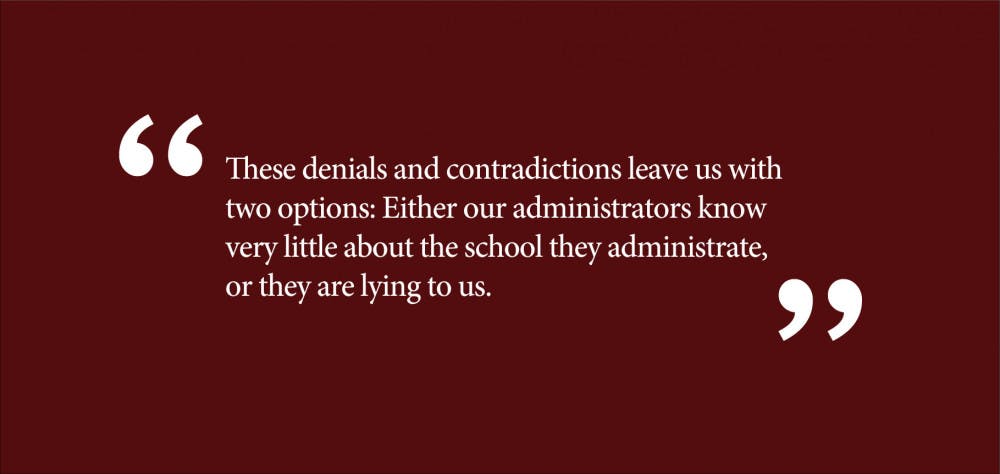In a February letter to the Providence Journal, President Christina Paxson P’19 claimed that “Brown’s central administration was not aware that some staff in Advancement was providing logistical support” for the now infamous Granoff dinners. In March, when The Herald reported that the Advancement Office arranged meetings between faculty and prospective students and asked professors to write notes for these students’ admission files, Dean of Admission Logan Powell claimed he was not aware of this practice. Senior Vice President for Advancement Sergio Gonzalez told The Herald that the Advancement Office had stopped asking professors for notes two years ago, even though email evidence obtained by the Herald suggests otherwise.
These denials and contradictions leave us with two options: Either our administrators know very little about the school they administrate, or they are lying to us. Just as much as our administrators seem to be in the dark, I am as well. As I write this, I am not even quite sure what the Advancement Office does — they do not even have an official website. This level of opacity is unacceptable.
In light of the recent revelations about the Advancement Office’s less-than-savory practices, as well as the unfolding national college admissions scandal, the Advancement Office should adopt and publish clear, consistent internal regulations, which should be monitored by Paxson’s office. For example, how should the Advancement Office interact with parents of prospective students, or the students themselves? In her 2015 State of Brown address, Christina Paxson asserted that admission and fundraising are separate. But if the Advancement Office is setting up meetings between prospective students and professors and asking these professors to provide content for students’ admission files, this is clearly not the case. I cannot think of a reason why the Advancement Office would interact with prospective students unless they were courting the parents for a donation. In order to ensure the admission process is fair, the Advancement Office should limit interactions with prospective students and their parents. To do so, the Advancement Office could officially commit to delaying discussions of donations with parents of children who have applied or are planning to apply to Brown; if they are not already, all interactions between parents of children who are juniors or seniors in high school should be subject to additional scrutiny.
Additionally, the Advancement Office needs a policy to regulate interactions with current students. As the Granoff dinners show, when the Advancement Office courts parents as potential donors, the special treatment of their children may not stop once they are admitted to the University. Students should be treated as students, not as potential donors or bargaining chips.
I understand that fundraising is important to non-profit institutions like Brown and in many ways, its success furthers my education. But the Advancement Office should be able to do its job without bolstering specific current and prospective students. It is Brown’s commitment to ethics and equity that should compel donors to contribute in the first place, and so affirming high fundraising standards could even help the Office do its job.
The University has demonstrated an ability to grow when scandal strikes — and I encourage Paxson to promote transparency as any investigation unfolds. In an email to the student body earlier this month, Paxson announced that a new ad hoc Committee on Equity and Integrity in Admissions will assess the admission process to ensure that it “lives up to Brown’s commitment to integrity, access and inclusion.” This committee should be sure to publish its findings and recommendations to the Brown community — enabling the community to hold the University accountable. The committee should also push the Advancement Office to adopt clear rules and make them widely accessible. To start, the Advancement Office should create a webpage that specifically details what it does and what its guidelines are.
This kind of oversight may seem excessive to some. But when the President of the University, the Dean of Admission and the Senior Vice President for advancement are all misinformed about what’s happening at the Advancement Office, it’s clear something big needs to change.
Rebecca Aman ’20 can be reached rebecca_aman@brown.edu. Please send responses to this opinion to letters@browndailyherald.com and op-eds to opinions@browndailyherald.com.





